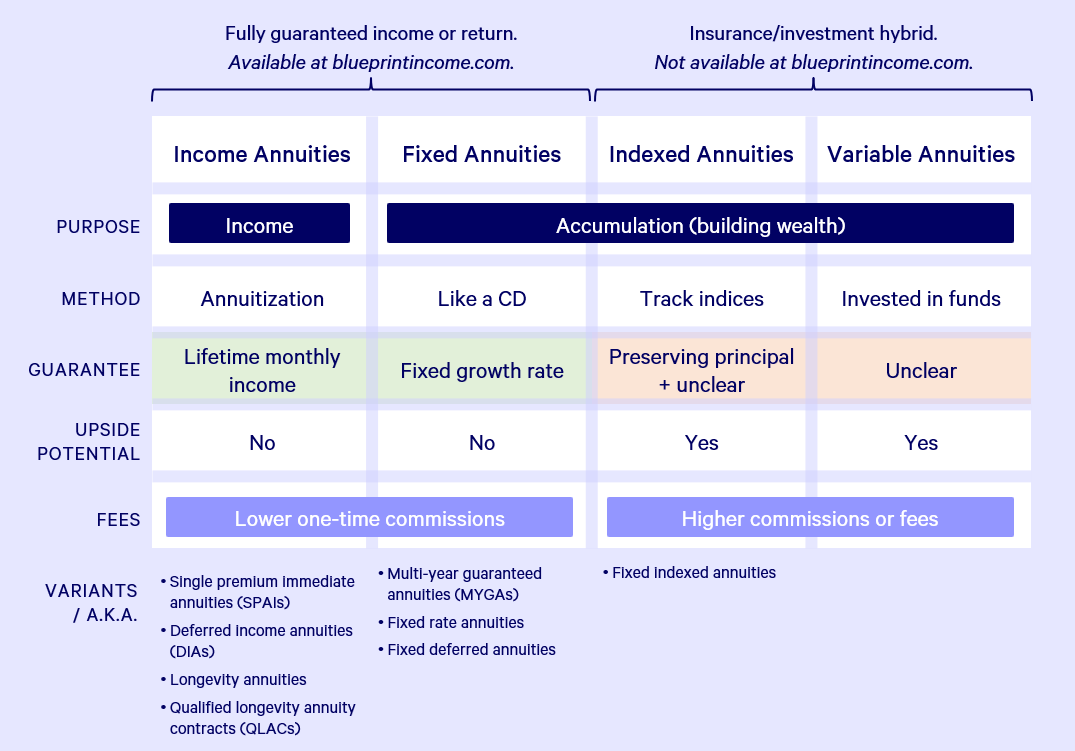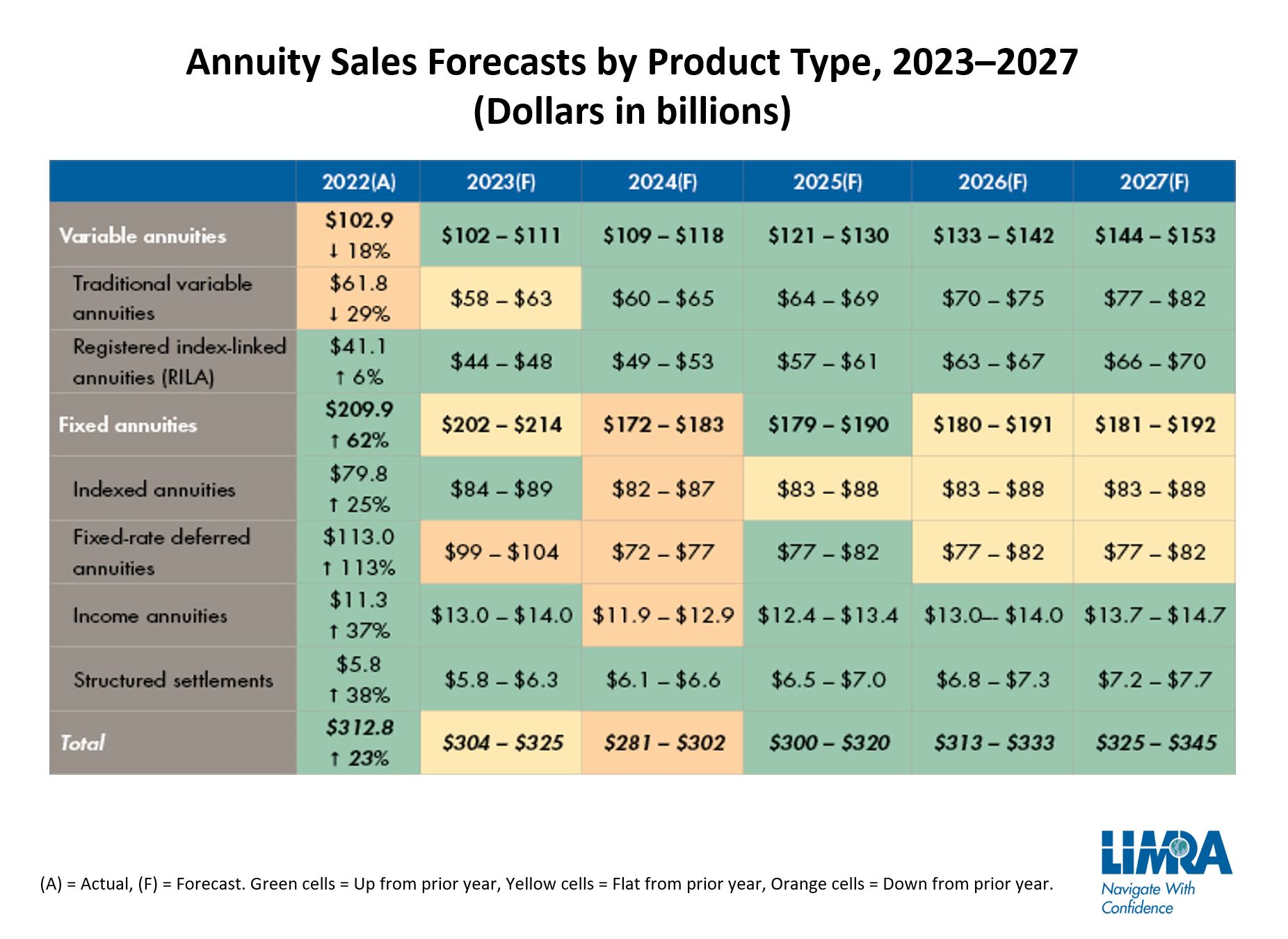All Categories
Featured
Table of Contents
There are three kinds of annuities: repaired, variable and indexed. With a repaired annuity, the insurance coverage company ensures both the price of return (the interest price) and the payout to the financier.
With a deferred fixed annuity, the insurer consents to pay you no much less than a defined rate of passion throughout the time that your account is growing. With an immediate fixed annuityor when you "annuitize" your postponed annuityyou receive an established fixed amount of money, normally on a regular monthly basis (similar to a pension plan).
While a variable annuity has the benefit of tax-deferred growth, its annual expenses are likely to be much higher than the costs of a typical mutual fund. And, unlike a dealt with annuity, variable annuities do not provide any type of warranty that you'll earn a return on your financial investment. Rather, there's a danger that you can actually shed cash.
Understanding Fixed Annuity Vs Equity-linked Variable Annuity Everything You Need to Know About Deferred Annuity Vs Variable Annuity Defining the Right Financial Strategy Benefits of Choosing the Right Financial Plan Why Annuity Fixed Vs Variable Is Worth Considering Variable Annuity Vs Fixed Annuity: Simplified Key Differences Between Different Financial Strategies Understanding the Risks of Deferred Annuity Vs Variable Annuity Who Should Consider Strategic Financial Planning? Tips for Choosing Variable Annuity Vs Fixed Annuity FAQs About Planning Your Financial Future Common Mistakes to Avoid When Choosing a Financial Strategy Financial Planning Simplified: Understanding Your Options A Beginner’s Guide to Annuities Fixed Vs Variable A Closer Look at Deferred Annuity Vs Variable Annuity
Due to the complexity of variable annuities, they're a leading source of financier grievances to FINRA. Prior to purchasing a variable annuity, thoroughly read the annuity's syllabus, and ask the person marketing the annuity to describe all of the item's functions, motorcyclists, costs and constraints. Indexed annuities generally offer a minimum guaranteed passion price combined with an interest price linked to a market index.
Understanding the attributes of an indexed annuity can be complicated. There are numerous indexing approaches companies use to compute gains and, because of the range and complexity of the methods made use of to credit report interest, it's hard to compare one indexed annuity to one more. Indexed annuities are normally categorized as one of the complying with two types: EIAs supply an assured minimum rate of interest (usually a minimum of 87.5 percent of the costs paid at 1 to 3 percent interest), in addition to an added rate of interest tied to the efficiency of several market index.

Conservative investors that value safety and stability. Those nearing retirement that desire to sanctuary their assets from the volatility of the stock or bond market. With variable annuities, you can purchase a range of securities including stock and bond funds. Stock exchange efficiency figures out the annuity's value and the return you will certainly get from the cash you invest.
Comfy with variations in the supply market and want your investments to equal inflation over a lengthy period of time. Youthful and intend to prepare monetarily for retired life by enjoying the gains in the supply or bond market over the long-term.
As you're constructing up your retirement financial savings, there are many ways to extend your cash. can be particularly useful financial savings devices because they ensure an earnings amount for either a collection time period or for the rest of your life. Dealt with and variable annuities are 2 choices that provide tax-deferred development on your contributionsthough they do it in different ways.
Highlighting Fixed Vs Variable Annuity Pros And Cons A Comprehensive Guide to Fixed Index Annuity Vs Variable Annuity Breaking Down the Basics of Investment Plans Pros and Cons of Fixed Vs Variable Annuity Why Tax Benefits Of Fixed Vs Variable Annuities Is Worth Considering How to Compare Different Investment Plans: Simplified Key Differences Between Different Financial Strategies Understanding the Rewards of Fixed Vs Variable Annuities Who Should Consider Strategic Financial Planning? Tips for Choosing Variable Vs Fixed Annuity FAQs About Pros And Cons Of Fixed Annuity And Variable Annuity Common Mistakes to Avoid When Choosing Fixed Vs Variable Annuity Pros And Cons Financial Planning Simplified: Understanding What Is Variable Annuity Vs Fixed Annuity A Beginner’s Guide to Fixed Income Annuity Vs Variable Growth Annuity A Closer Look at Annuities Variable Vs Fixed
A provides a guaranteed interest price. Your contract value will certainly increase due to the amassing of guaranteed passion profits, suggesting it won't lose worth if the market experiences losses.
A consists of bought the stock exchange. Your variable annuity's investment efficiency will certainly affect the size of your nest egg. It might guarantee you'll obtain a collection of payouts that start when you retire and can last the remainder of your life, given you annuitize (start taking payments). When you begin taking annuity repayments, they will rely on the annuity worth during that time.
Market losses likely will cause smaller payments. Any interest or other gains in either type of agreement are protected from current-year taxes; your tax obligation responsibility will come when withdrawals start. Let's look at the core functions of these annuities so you can determine just how one or both may fit with your total retirement method.

A fixed annuity's value will not decrease due to market lossesit's regular and secure. On the other hand, variable annuity worths will change with the efficiency of the subaccounts you elect as the marketplaces fluctuate. Profits on your dealt with annuity will very depend upon its acquired rate when bought.
On the other hand, payout on a fixed annuity acquired when rates of interest are reduced are more probable to pay out profits at a lower price. If the rates of interest is assured for the size of the contract, revenues will certainly remain constant despite the marketplaces or rate task. A set rate does not imply that dealt with annuities are risk-free.
While you can't land on a fixed rate with a variable annuity, you can pick to invest in conservative or aggressive funds tailored to your threat level. Extra conventional financial investment options, such as short-term bond funds, can help lower volatility in your account. Considering that taken care of annuities offer an established price, reliant upon present rate of interest, they do not offer that exact same flexibility.
Analyzing Strategic Retirement Planning Everything You Need to Know About Financial Strategies What Is Pros And Cons Of Fixed Annuity And Variable Annuity? Advantages and Disadvantages of Different Retirement Plans Why Choosing the Right Financial Strategy Is a Smart Choice How to Compare Different Investment Plans: Simplified Key Differences Between Different Financial Strategies Understanding the Key Features of Long-Term Investments Who Should Consider Strategic Financial Planning? Tips for Choosing the Best Investment Strategy FAQs About Planning Your Financial Future Common Mistakes to Avoid When Choosing What Is Variable Annuity Vs Fixed Annuity Financial Planning Simplified: Understanding Variable Vs Fixed Annuities A Beginner’s Guide to Smart Investment Decisions A Closer Look at How to Build a Retirement Plan

You possibly could make a lot more lengthy term by taking additional risk with a variable annuity, but you might additionally lose money. While repaired annuity contracts stay clear of market danger, their compromise is much less growth possibility.
Investing your variable annuity in equity funds will certainly provide more potential for gains. The costs connected with variable annuities may be higher than for various other annuities.
The insurance firm might enforce surrender costs, and the IRS may impose an early withdrawal tax fine. They start at a specific percent and then decline over time.
Annuity earnings are subject to a 10% very early withdrawal tax charge if taken before you reach age 59 unless an exception applies. This is enforced by the internal revenue service and puts on all annuities. Both taken care of and variable annuities give choices for annuitizing your balance and turning it into a guaranteed stream of life time income.
Exploring the Basics of Retirement Options Key Insights on Your Financial Future What Is Choosing Between Fixed Annuity And Variable Annuity? Advantages and Disadvantages of Tax Benefits Of Fixed Vs Variable Annuities Why Fixed Indexed Annuity Vs Market-variable Annuity Is Worth Considering How to Compare Different Investment Plans: Explained in Detail Key Differences Between Fixed Index Annuity Vs Variable Annuities Understanding the Risks of Immediate Fixed Annuity Vs Variable Annuity Who Should Consider Fixed Annuity Or Variable Annuity? Tips for Choosing Fixed Annuity Vs Variable Annuity FAQs About Fixed Index Annuity Vs Variable Annuity Common Mistakes to Avoid When Choosing Annuities Fixed Vs Variable Financial Planning Simplified: Understanding Fixed Annuity Vs Variable Annuity A Beginner’s Guide to Smart Investment Decisions A Closer Look at How to Build a Retirement Plan
You may decide to utilize both taken care of and variable annuities. Yet if you're picking one over the various other, the distinctions issue: A may be a far better choice than a variable annuity if you have a much more traditional danger resistance and you seek foreseeable passion and principal defense. A might be a better choice if you have a greater danger tolerance and desire the potential for long-lasting market-based development.
Annuities are agreements sold by insurance provider that promise the purchaser a future payment in normal installments, generally month-to-month and commonly permanently. There are various types of annuities that are created to offer various objectives. Returns can be taken care of or variable, and payouts can be prompt or postponed. A set annuity guarantees payment of a set quantity for the term of the arrangement.
A variable annuity varies based upon the returns on the shared funds it is invested in. Its worth can go up or down. An immediate annuity begins paying out as quickly as the purchaser makes a lump-sum settlement to the insurance company. A deferred annuity starts payments on a future date set by the customer.
Annuities' returns can be either dealt with or variable. With a fixed annuity, the insurance policy business assures the buyer a details payment at some future day.
Table of Contents
Latest Posts
Analyzing What Is A Variable Annuity Vs A Fixed Annuity A Comprehensive Guide to Fixed Indexed Annuity Vs Market-variable Annuity Breaking Down the Basics of Indexed Annuity Vs Fixed Annuity Advantage
Exploring the Basics of Retirement Options Everything You Need to Know About Fixed Annuity Vs Equity-linked Variable Annuity Breaking Down the Basics of Choosing Between Fixed Annuity And Variable Ann
Breaking Down Variable Vs Fixed Annuity Everything You Need to Know About Variable Vs Fixed Annuities Breaking Down the Basics of Investment Plans Benefits of Choosing the Right Financial Plan Why Fix
More
Latest Posts